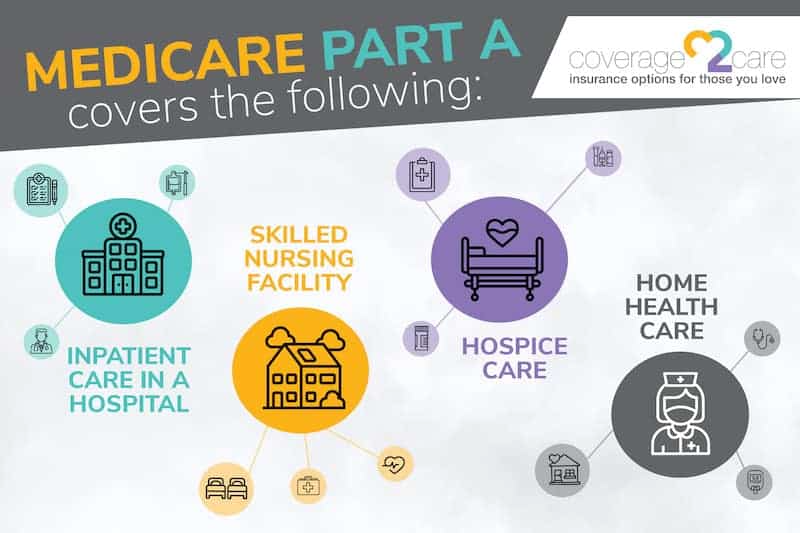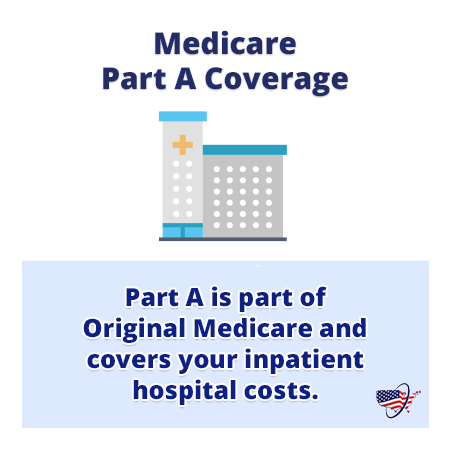Table of Contents
Medicare
- Medicare Part A includes coverage for inpatient hospital stays, skilled nursing facility care, and hospice services.
- Most people do not pay a monthly premium for Part A if they have worked and paid payroll taxes in the U.S. for at least 10 years.
- While Part A covers the majority of costs, beneficiaries are responsible for the deductible and coinsurance.
At Unity Benefits Group, we describe it as including “room and board” during your hospital stay. This means Part A covers a semi-private room, meals, medications provided by the hospital, and any required lab tests or medical supplies.
Inpatient care can be received in various settings, such as acute care hospitals, critical access hospitals, inpatient mental health facilities, or rehabilitation centers.

Medicare
- Medicare Part A includes coverage for inpatient hospital stays, skilled nursing facility care, and hospice services.
- Most people do not pay a monthly premium for Part A if they have worked and paid payroll taxes in the U.S. for at least 10 years.
- While Part A covers the majority of costs, beneficiaries are responsible for the deductible and coinsurance.
At Unity Benefits Group, we describe it as including “room and board” during your hospital stay. This means Part A covers a semi-private room, meals, medications provided by the hospital, and any required lab tests or medical supplies.
Inpatient care can be received in various settings, such as acute care hospitals, critical access hospitals, inpatient mental health facilities, or rehabilitation centers.

What Does Medicare Part A Cover?
Part A also covers certain home health care services that are received during or immediately after a hospital stay. This can include skilled nursing care, medical social services, and physical therapy. However, home health aide services are typically covered only if skilled nursing care is also being provided.
It’s important to note that Medicare does not cover long-term care, such as extended stays in a nursing home. For those looking to plan for long-term care, purchasing long-term care insurance might be an option to consider.

Is Medicare Part A free?
Typically, if you’ve worked for 10 years in the U.S., you won’t need to pay anything for Part A. If you don’t have this work history, you can still buy Part A if you’ve been a legal resident or green card holder for at least 5 years. For more details on Part A costs, check out our Medicare costs page.
If you haven’t earned 40 quarters of work, you can still pay for Part A. In 2024, the premium is $505 per month for those with fewer than 30 quarters and $278 for those with 30 to 39 quarters.
When do I enroll in Medicare Part A?
If you haven’t earned 40 quarters of work, you can still pay for Part A. In 2024, the premium is $505 per month for those with fewer than 30 quarters and $278 for those with 30 to 39 quarters.

If you’re not already receiving Social Security or Railroad Retirement benefits, you will need to actively enroll in Part A when you turn 65. You can complete this process on the Social Security website.
What are lifetime reserve days?
If you have another hospital stay the year after lasting 120 consecutive days, you will have used up 30 (10 + 20) of your lifetime reserve days total. Once you have used up all of your lifetime reserve days, you will be responsible for all Part A costs starting on day 91 for any hospital stay lasting longer than 90 days.
Skilled-nursing facility costs
How do I sign up for Medicare Part A only?
What is the difference between Medicare Part A and Part B?
How much is Medicare Part A?
For assistance with your Medicare insurance or to learn more about hospital coverage under Medicare, contact our insurance experts at (817) 249-8600 for a FREE consultation!
Key Takeaways
- Medicare Part A covers inpatient room and board, daily meals, hospice care, skilled nursing, and home health care.
- Most people receive Part A without a premium, but those who haven’t worked in the U.S. for at least 10 years may have to pay a premium.
- Before Medicare Part A covers most of your costs, you must meet the Part A deductible.
